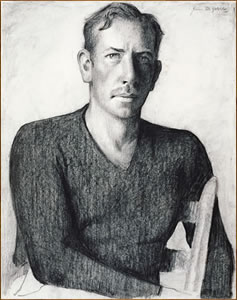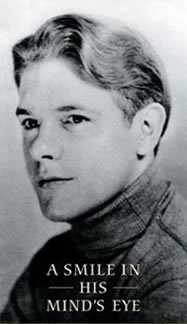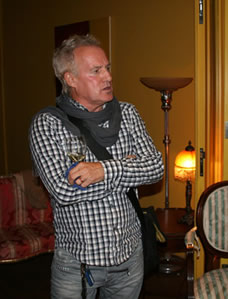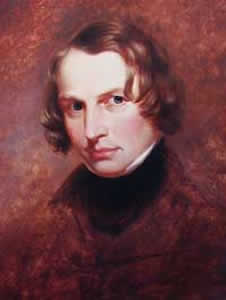|
De Amerikaanse schrijver John Steinbeck werd geboren in Salinas, Californië, op 27 februari 1902. Zie ook alle tags voor John Steinbeck op dit blog.xml:namespace prefix = o ns = "urn:schemas-microsoft-com:office:office" />
Uit: Früchte des Zorns (Vertaald door Klaus Lambrecht)
Über das rote Land und einen Teil des grauen Landes von Oklahoma fiel sanft der letzte Regen; aber er drang nicht in die rissige Erde ein. Die Pflüge kreuzten wieder und immer wieder die kleinen Furchen der Bäche. Der letzte Regen ließ das Korn und das Unkraut und das Gras am Rande der Straßen rasch wachsen, und bald begannen das graue Land und das dunkelrote Land unter einer grünen Decke zu verschwinden.
Am Ende des Monats Mai wurde der Himmel bleich, und die Wolken, die in dichten Ballen den ganzen Frühling über herabgehangen hatten, lösten sich auf. Die Sonne brannte hernieder auf das wachsende Korn, Tag für Tag, bis die grünen Speere an den Rändern braune Streifen bekamen.
Wolken tauchten auf und verschwanden wieder, und nach einer Weile kamen sie überhaupt nicht mehr. Das Unkraut wurde dunkelgrün, um sich zu schützen, aber es wucherte nicht mehr. Die Erde setzte eine Kruste an, eine dünne, harte Kruste, und wie der Himmel bleich wurde, so wurde auch die
Erde bleich blaßrot das rote Land und weiß das graue Land. In den Wasserrinnen trocknete die Erde zu Staub, zu trokkenen kleinen Strömen. Goffer und Ameisenlöwen setzten kleine Lawinen in Bewegung. Und da die stechende Sonne Tag für Tag herniederbrannte, blieb das Korn nicht mehr steif und aufrecht. Erst beugte es sich nur ein wenig, und dann, als auch die starken Mittelrippen ihre Kraft verloren, neigten sich die Blätter ganz nach unten.
Dann kam der Juni, und die Sonne schien nun noch brennender. Die braunen Streifen an den Getreideblättern verbreiterten sich bis zu den Mittelrippen. Das Unkraut wurde welk und trocknete ein. Die Luft war dünn und der Himmel noch bleicher, und mit jedem Tag bleichte auch die Erde mehr.
Auf den Straßen, wo die Gespanne entlangzogen, wo die Räder den Boden zermahlten und die Hufe der Pferde den Boden zertraten, brach die Schmutzkruste, und Staub bildete sich. Jedes sich bewegende Ding hob den Staub in die Luft: bei einem Menschen hob er sich bis zu den Hüften, bei einem Wagen bis über die Plane, und ein Auto wirbelte eine mächtige Wolke hinter sich auf. Es dauerte lange, bis der Staub sich wieder gelegt hatte.

John Steinbeck (27 februari 1902 - 20 december 1968)
Portret door James Fitzgerald
De Britse dichter en schrijver Lawrence George Durrell werd geboren op 27 februari 1912 in Jalandhar in India. Zie ook alle tags voor Lawrence Durrell op dit blog.
Je est un autre
Je est un autre. Rimbaud
He is the man who makes notes,
The observer in the tall black hat
Face hidden in the brim:
He has watched me watching him.
The street-corner in Buda and after
By the post-office a glimpse
Of the disappearing tails of his coat,
Gave the same illumination, spied upon,
The tightness in the throat.
Once too meeting by the Seine
The waters a moving floor of stars,
He had vanished when I reached the door,
But there on the pavement burning
Lay one of his familiar black cigars.
The meeting on the stairway
Where the tide ran clean as a loom:
The betrayal of her, her kisses
He has witnessed them all: often
I hear him laughing in the other room.
He watched me now, working late,
Bringing a poem to life, his eyes
Reflect the malady of De Nerval:
O useless in this old house to question
The mirrors, his impenetrable disguise.

Lawrence Durrell (27 februari 1912 7 november 1990)
De Canadese dichter, schrijver en essayist André Roy werd geboren op 27 februari 1944 in Montréal. Zie ook mijn blog van 27 februari 2010 en ook mijn blog van 27 februari 2011.
La réalité, le poète
La réalité corrige nos sentiments.
À qui appartient ce texte?
Pour quelle peau ?
Tu penses à la lenteur des mots,
aux métaphores sur le vide entre deux étoiles,
au poète mince qui les écrit.
Qui a commis ce texte comme un péché?
Tu te réveilles, tu penses,
tu sens ton cur dépenser follement son sang.
Il fait matin, terre qui tremble,
les fantômes sont partis
une fois lacte sexuel accompli.
Je ne veux pas la fin de tout;
je veux le goût, la fièvre,
la beauté promise,
les mots en expansion dans lespace.
Quelle heure est-il quand tu deviens doux ?
Il nest jamais trop tard pour attendre
que les autres soient minces avec nous deux.
Le texte corrige mon sexe,
le rend simple pour toi,
il se montre courageux.
Jécris comme on se réveille
dans la réalité aux deux mille noms.
Je me lève, jécris, je suis encore adorable.
Le temps des horloges lentes,
le nord glissant vers le sud,
le bleu déchiré au bord du ciel,
jai encore ma peau des sept jours de la semaine.
Poème qui fait du bruit,
fête-le!
Dis le poème, le texte qui craque,
qui dit oui, qui dit non.
Croque-moi doux,
donne-moi des exemples de métaphores.
Le poète na pas peur,
il est proche de toi
qui te tiens debout entre les étoiles.
Jai toujours écrit dans le bleu,
celui du plein, du pas-pareil,
du souvenir aux quatre vérités.
Texte qui est,
exemple du cri,
du fait dêtre réellement né.
La réalité sur mes épaules,
construite de passé et de présent,
nest plus une métaphore;
cest seulement toi étonné
de voir la folle vie imiter la vie folle
dans un poème écrit en lan 2007.

André Roy (Montréal, 27 februari 1944)
De Amerikaanse dichter Henry Wadsworth Longfellow werd geboren in Portland, Maine, op 27 februari 1807. Zie ook alle tags voor Henry Longfellow op dit blog.
A Dutch Picture
Simon Danz has come home again,
From cruising about with his buccaneers;
He has singed the beard of the King of Spain,
And carried away the Dean of Jaen
And sold him in Algiers.
In his house by the Maese, with its roof of tiles,
And weathercocks flying aloft in air,
There are silver tankards of antique styles,
Plunder of convent and castle, and piles
Of carpets rich and rare.
In his tulip-garden there by the town,
Overlooking the sluggish stream,
With his Moorish cap and dressing-gown,
The old sea-captain, hale and brown,
Walks in a waking dream.
A smile in his gray mustachio lurks
Whenever he thinks of the King of Spain,
And the listed tulips look like Turks,
And the silent gardener as he works
Is changed to the Dean of Jaen.
The windmills on the outermost
Verge of the landscape in the haze,
To him are towers on the Spanish coast,
With whiskered sentinels at their post,
Though this is the river Maese.
But when the winter rains begin,
He sits and smokes by the blazing brands,
And old seafaring men come in,
Goat-bearded, gray, and with double chin,
And rings upon their hands.
They sit there in the shadow and shine
Of the flickering fire of the winter night;
Figures in color and design
Like those by Rembrandt of the Rhine,
Half darkness and half light.
And they talk of ventures lost or won,
And their talk is ever and ever the same,
While they drink the red wine of Tarragon,
From the cellars of some Spanish Don,
Or convent set on flame.
Restless at times with heavy strides
He paces his parlor to and fro;
He is like a ship that at anchor rides,
And swings with the rising and falling tides,
And tugs at her anchor-tow.
Voices mysterious far and near,
Sound of the wind and sound of the sea,
Are calling and whispering in his ear,
'Simon Danz! Why stayest thou here?
Come forth and follow me!'
So he thinks he shall take to the sea again
For one more cruise with his buccaneers,
To singe the beard of the King of Spain,
And capture another Dean of Jaen
And sell him in Algiers

Henry Longfellow (27 februari 1807 - 24 maart 1882)
Portret door Cephus Giovanni Thompson, 1840
Zie voor nog meer schrijvers van de 27e februari ook mijn vorige blog van vandaag en eveneens mijn eerste blog van vandaag.
|



